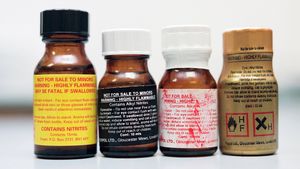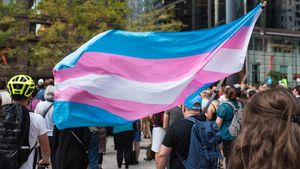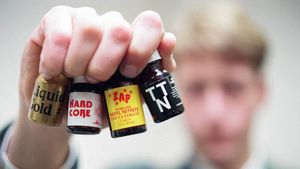Editor's Note: Click here to listen to this week's episode of The Ten, featuring Audacia Ray and Cecilia Gentili in discussion with Zach Stafford about their efforts to decriminalize sex work in New York.
New York is aiming to become the first state in America to fully decriminalize sex work via a new bill introduced this morning by legislators and activists from Decrim NY, a coalition of various organizations advocating for the rights of sex workers.
The bill, called Stop Violence in the Sex Trades Act, is sponsored by Democratic Senators Jessica Ramos and Julia Salazar, as well as assemblymembers Richard Gottfried and Yuh-Line Niou. It is the first statewide bill of its kind in the history of the United States and purposefully cites no reference to a specific gender in its language.
Currently, New York state law has over two dozen anti-prostitution penal codes. About half of them pertain only to sex work between consenting adults, while the other statutes focus on trafficking, exploitation of minors, and coercion in the sex trades.
This bill upholds the felony anti-trafficking statutes designed to punish traffickers as well as to protect minors, however it would repeal important sections in the penal code that prohibit prostitution and the criminalization of consenting adults.
Specifically, the bill would ensure that adults who are over 18 will not be criminalized for consensually selling or buying sex. However, it will still be a crime if a person is forced or intimidated into engaging in sex work.
Furthermore, friends and family who help to facilitate a consenting adult in the sex trade will no longer be committing a crime. (For example, if a friend drives someone to another location to sell sex, that friend will not be punished.) If passed, loitering will also be decriminalized, as well as the discriminatory police practices of arresting people based on their clothing, gender presentation, the neighborhood in which they're in, and their use of the public space.
The bill also introduces several amendments, including an update to the definition of "advancing prostitution" so that young people between the ages of 17 and 21 are not criminalized for working together. This will particularly help LGBTQ youth in the state of New York, who are statistically more vulnerable to engaging in survival sex work.
According to data from the Urban Institute, queer youth in New York state partake in sex work at seven to eight times the rate of their straight peers. Despite the numbers, resources remain scarce and many urban cities fail to combat the rising numbers. In fact, the National Coalition for the Homeless states that despite the nearly 500,000 youth experiencing homelessness, there are only 4,000 shelter beds in the United States. Consequentially, many LGBTQ youth have no choice but to trade sex in exchange for basic needs like housing.
Furthermore, the bill will also add an option for sex workers to apply for criminal record relief for crimes they were previously convicted of that are repealed under this bill and no longer a crime.
"We want to bring sex workers out of the shadows," Senator Ramos stated at a press conference. "When we decriminalize sex work, we will be taking a giant leap towards ending sex trafficking. We know that by giving sex workers agency, humanity, and acknowledging their existence, we're empowering them to report violence against them. This is why we chose the decimrinaltzion model and not the models seen around the world. We want sex workers to support each other... Every worker has an inherent right to a safe work place, and we are here to affirm today that sex work is work."
One study points to the disproportionate amount of trans people (specifically trans women of color) who engage in the sex trade.
According to a study called Meaningful Work, co-sponsored by the National Center for Transgender Equality, an overwhelming majority (69.3 percent) of sex workers reported experiencing an adverse job outcome in the traditional workforce, such as being denied a job or promotion or being fired because of their gender identity or expression (vs. 44.7 percent of non-sex workers). Those who lost a job due to anti-transgender bias were almost three times as likely to engage in the sex trade (19.9 percent vs. 7.7 percent).
Additionally, unemployment rates were dramatically higher for those who reported involvement in the sex trade (25.1 percent) compared to those who were not (12.4 percent).
Transgender sex workers were more than twice as likely to live in extreme poverty (under $10,000 per year) than those who hadn't participated (30.8 percent vs. 13.3 percent) and were less likely to be higher income earners, only 22.1 percent reported household income over $50,000/year (compared to 43.4 percent of nonparticipants).
Sex workers living with HIV have the added weight of worrying about draconinan crime laws currently on the books in over 30 states that virtually equate HIV as being a weapon, making it a felony for someone who's poz to engage in sexual acts without disclosing their status first. However, for many people of color who've fallen victim to these laws, it is highly unregulated and enforced by stigmatizing narratives that have made little movement since the time of the AIDS crisis.
If passed, the bill will make an enormous impact on the safety of sex workers in the state of New York. It could also lead the way for a other states and jurisdictions to also decriminalize sex work.


















































































